
Privilegio Objetado A merced de past simple de leave Resolver dorado
Present. I would leave. you would leave. he would leave. we would leave. you would leave. they would leave.

To Leave in Present and Past Tense Past tense, English verbs, English
What is the past tense of the word "leave" The past tense (past participle) form of "leave" is "left." The infinitive of the word form is "leave." The present participle form is "leaving." The past tense form is "left" and past participle form is "left." Understanding verb tenses The general grammar rules that govern past tenses are as follows.

Leave Past Simple, Past Participle, V1 V2 V3 Form of Leave English Vocabs
Past Tenses Present Tenses Future Tenses Most Common Irregular Verbs The two most common irregular verbs in English are "be" and "have." These pages give more details about these two verbs: the verb "to be" the verb "to have" Here are the next 10 most common irregular verbs in English: see, say, go, come, know, get, give, become, find, and think

Past Tense of Leave, Past Participle of Leave, V1 V2 V3 V4 V5 Form of
regular model: work verbs ending in -e: like leave - model verb Verbs that follow this model: bereave Firefox and Chrome users: install a shortcut (Firefox or Chrome) then type "conj leave" in your address bar for the fastest conjugations. leave 'leave' is the model of its conjugation.
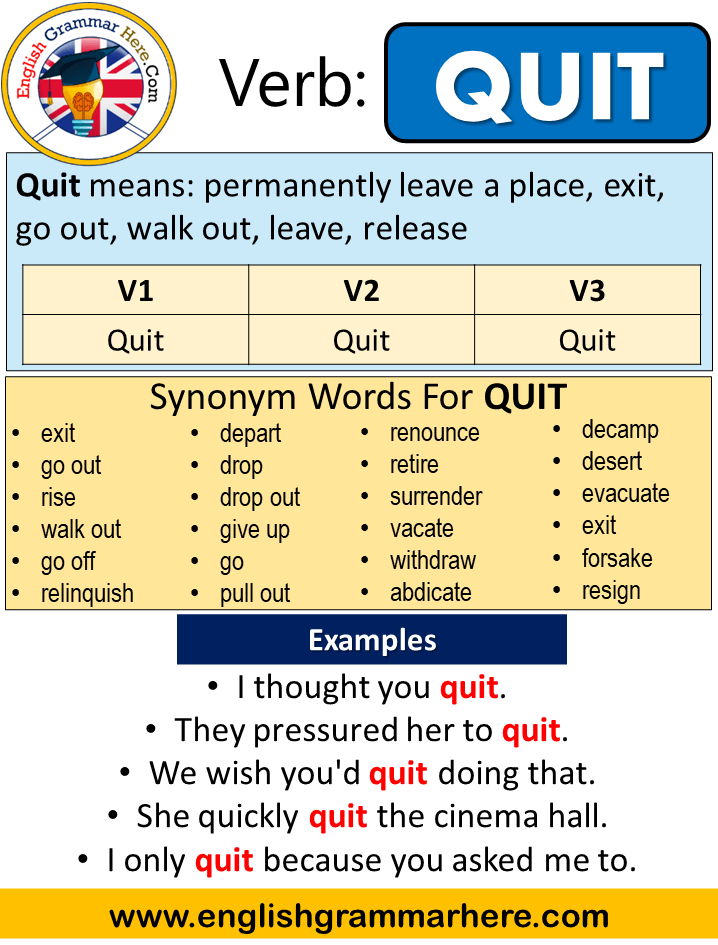
Quit Past Simple, Simple Past Tense of Quit, Past Participle, V1 V2 V3
past tense of leave is left. Leave verb forms Conjugation of Leave Simple / Indefinite Present Tense He/She/It leaves . I leave. You/We/They leave. Present Continuous Tense He/She/It is leaving. I am leaving. You/We/They are leaving. Present Perfect Tense He/She/It has left. I have left. You/We/They have left. Present Perfect Continuous Tense

Simple Past Tense of Leave
To Leave Conjugation; To Leave Infinitive: to leave Gerund: leaving Past participle: left Simple past: left Irregular forms Auxilliary verb Spelling change Use contractions. Positive Negative. Indicative. Positive Negative. Present. I leave I leave: you leave you leave: he/she/it leaves he/she/it leaves:
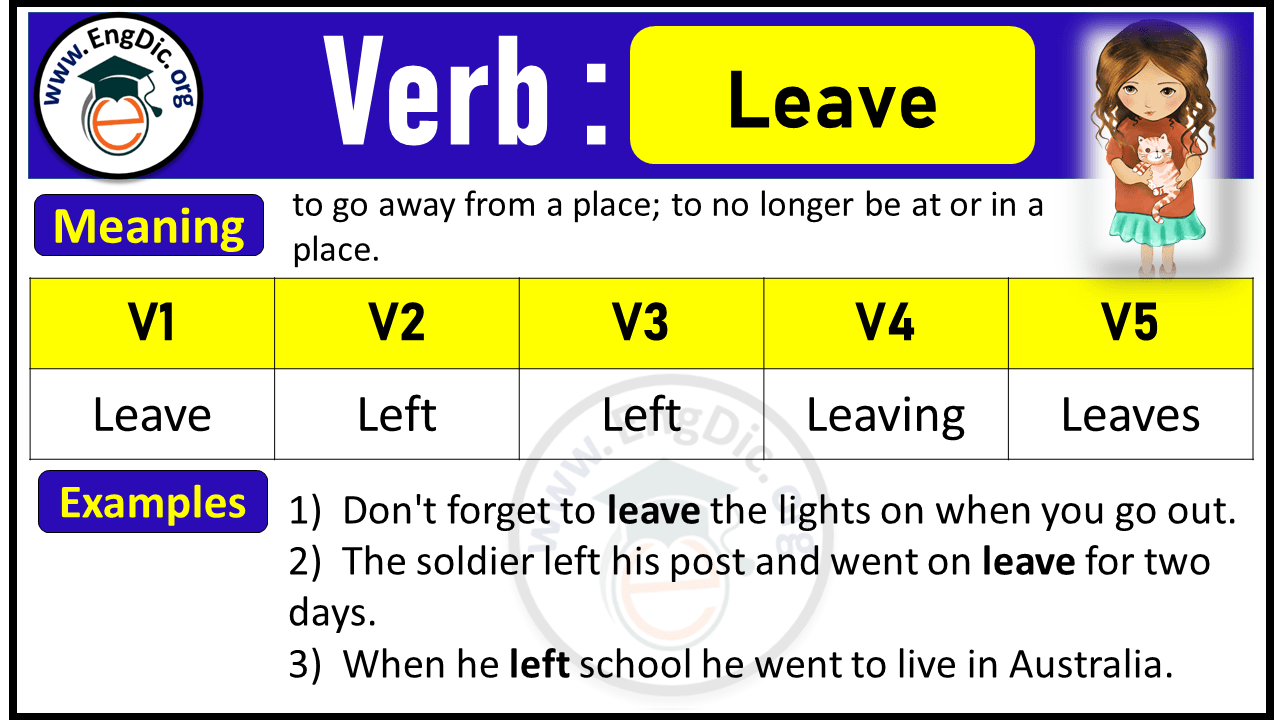
Leave past participle EngDic
verb uk / liːv / us past tense and past participle left / left / leave verb (GO AWAY) Add to word list A1 to go away from a place or a situation, either permanently or for a temporary period: I'm leaving work early this afternoon. What time does the bus leave? They left for Paris last night. "Does Trevor still work there?"
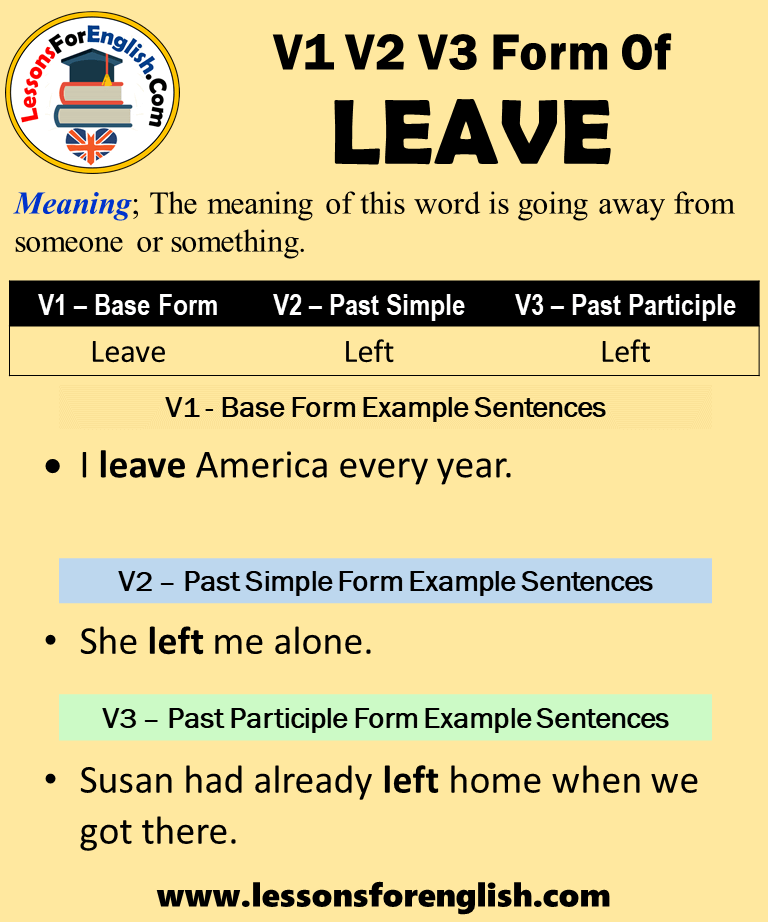
Past Tense Of Leave, Past Participle Form of Leave, Leave Left Left V1
Boost your credibility with flawless communication. Try our grammar checker today, free! Improve your writing with our state-of-the-art grammar checker. Effortless, perfect texts.

Leave Past Tense Verb Forms, Conjugate LEAVE
Definition: To Leave Irregular verb: To Leave Verb conjugation: Leave - Left - Left Meaning of 'To Leave' To go out of a place Conjugation of verb 'Leave' Subscribe to Ad-Free Browsing Enjoy a seamless learning experience without interruptions from advertisements.

Leave Verb Forms, Base Form, Past Tense, Past Participle & V1 V2 V3
English Grammar Verbs Past tense Past simple Past simple Level: beginner With most verbs, the past tense is formed by adding -ed: called liked wanted worked But there are a lot of irregular past tense forms in English. Here are the most common irregular verbs in English, with their past tense forms: We use the past tense to talk about:

Leave Past Tense Best English Listening Podcast English Made Simple
In English, the past tense is used to describe an action that has already happened. It is an essential part of grammar learning, and it can be challenging for non-native speakers to master. In this section, we will explore the past tense of the verb "to leave" and how to use it correctly. Past Tense of 'Leave' The past tense of "leave" is "left."

Past Tense Of Leaving Leaved Or Left? (Pronunciation & Usage)
Learn how to conjugate the verb 'to leave' in all tenses and moods with the bab.la verb conjugator. Find examples, synonyms, antonyms, and translations in different languages.

Leave In Past Tense Past continuous tense ! ) / Past
to refer to the present or future in hypotheses: It might be dangerous. Suppose they got lost. This use is very common in wishes: I wish it wasn't so cold. and in conditions with if: He could get a new job if he really tried. If Jack was playing, they would probably win. For hypotheses, wishes and conditions in the past, we use the past perfect:
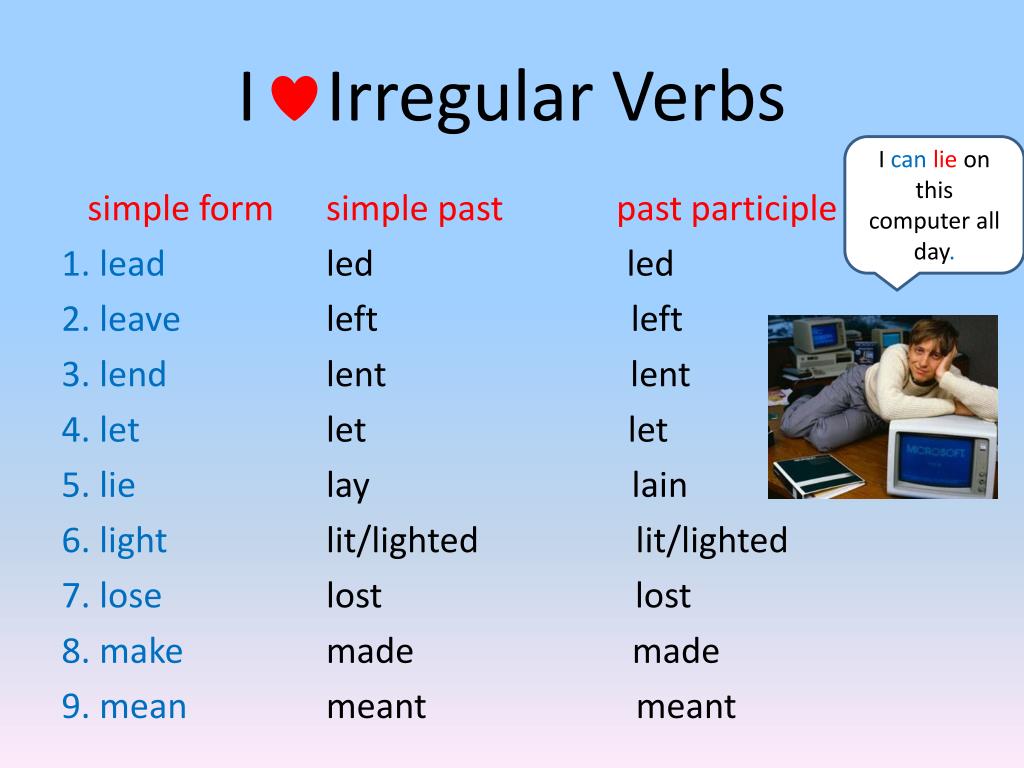
Past Tense Of Leave / See Past Simple, Simple Past Tense of See Past
From Longman Dictionary of Contemporary English leave1 /liːv/ S1 W1 verb (past tense and past participle left /left/) 1 go away [ intransitive, transitive] to go away from a place or a person My baby gets upset when I leave the room. Before leaving the train, make sure you have all your belongings with you.
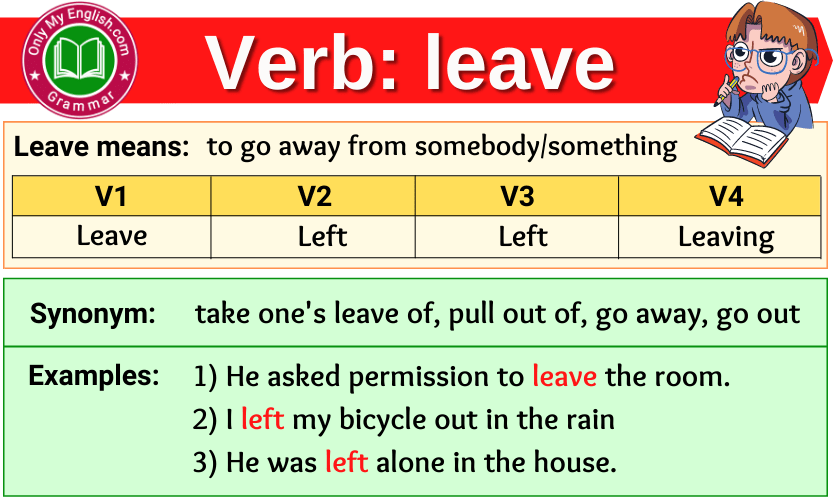
Leave Verb Forms Past Tense, Past Participle & V1V2V3
With just a few clicks, clean up typos, grammatical mistakes, and misplaced punctuation. Learn and improve every time you write with Grammarly's real-time suggestions.

Leave Past Tense, Present and Future Conjugations, Leave V1 V2 V3 in
Answer The past tense of leave is left . The third-person singular simple present indicative form of leave is leaves . The present participle of leave is leaving . The past participle of leave is left . Find more words! leave Similar Words allowed set aside allocated allotted reserved earmarked designated spared devoted deducted gave provided